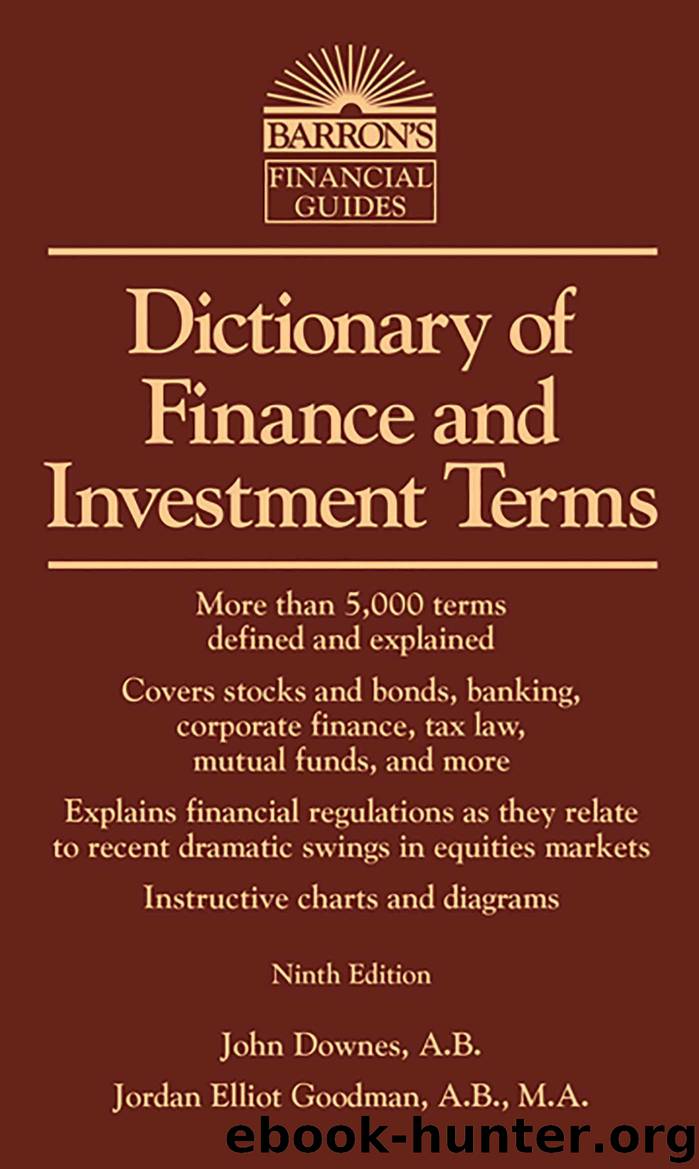Dictionary of Finance and Investment Terms by John Downes Jordan Goodman

Author:John Downes, Jordan Goodman
Language: eng
Format: epub
Published: 2018-12-07T16:00:00+00:00
AUTOMATED BOND SYSTEM (ABS) New York Stock Exchange computerized system that records bids and offers for inactively traded bonds until they are cancelled or executed. Before the ABS, such limit orders were kept in steel cabinets, giving rise to the terms CABINET SECURITY and CABINET CROWD (traders in inactive bonds).
AUTOMATED CLEARING HOUSE (ACH) nationwide electronic network that processes debit and credit transactions between participating banks and reduces FLOAT to one day.
AUTOMATED CONFIRMATION TRANSACTION (ACT) SERVICE postexecution service of NASDAQ that speeds price and volume reporting, comparison, and clearing of prenegotiated trades in NASDAQ and OTC BULLETIN BOARD securities.
AUTOMATED ORDER ENTRY SYSTEM electronic system that expedites the execution of smaller orders by channeling them directly to the specialist on the exchange floor, bypassing the FLOOR BROKER. The New York Stock Exchange calls its system DOT (Designated Order Turnaround). Other systems include Auto Ex, OSS, PACE, SOES, and SOREX.
AUTOMATIC EXTENSION granting of more time for a taxpayer to file a tax return. By filing an IRS Form 4868 by the original due date of the tax return, a taxpayer can automatically extend his or her filing date by four months, though the tax payment (based on the taxpayer’s best estimate) is still due on the original filing date.
AUTOMATIC FUNDS TRANSFER fast and accurate transfer of funds, often internationally, from one account or investment vehicle to another without direct management, using modern electronic and telecommunications technology. A broker’s instant transfer of stock sale proceeds to a money market fund is one example.
AUTOMATIC INVESTMENT PROGRAM any program in which an investor can accumulate or withdraw funds automatically. Some of the most popular automatic investment programs include:
• mutual fund debit programs, in which a mutual fund will automatically debit a preset amount from a bank savings or checking account to buy fund shares on a weekly, monthly, quarterly, or annual basis.
• mutual fund reinvestment programs, in which all dividends and capital gains are automatically reinvested in more shares of the fund.
• stock dividend reinvestment plans, in which companies offer their shareholders the opportunity to reinvest their dividends in more shares of the company, and in some cases, buy additional shares at a discount with little or no brokerage commissions.
• defined contribution plans, offered by employers to their employees, which allow automatic investment in several funds through payroll deduction. Corporate plans are called 401(k), nonprofit and educational plans are called 403(b), and federal and municipal government plans are called 457s. To entice employees to participate in these plans, many employers match employee contributions.
• savings bond payroll savings plans, which allow employees to purchase savings bonds through payroll deduction.
In addition to allowing automatic purchases of shares, automatic investment programs also permit participants to withdraw a set amount of money on a regular basis. These are known as AUTOMATIC WITHDRAWAL plans. For example, a retiree may request that a mutual fund automatically sell a fixed dollar amount of shares every month and send him or her a check.
AUTOMATIC REINVESTMENT see CONSTANT DOLLAR PLAN; DIVIDEND REINVESTMENT PLAN.
AUTOMATIC STABILIZERS expenditures
Download
This site does not store any files on its server. We only index and link to content provided by other sites. Please contact the content providers to delete copyright contents if any and email us, we'll remove relevant links or contents immediately.
Periodization Training for Sports by Tudor Bompa(8272)
The Body: A Guide for Occupants by Bill Bryson(5096)
The MacArthur Bible Commentary by John MacArthur(4826)
The Sports Rules Book by Human Kinetics(4386)
What It Really Takes to Get Into Ivy League and Other Highly Selective Colleges by Hughes Chuck(3760)
Marijuana Grower's Handbook by Ed Rosenthal(3682)
The Sprouting Book by Ann Wigmore(3592)
The Martian by Andy Weir(3427)
Salt, Fat, Acid, Heat: Mastering the Elements of Good Cooking by Nosrat Samin(3147)
Harry Potter 4 - Harry Potter and The Goblet of Fire by J.K.Rowling(3073)
Sapiens and Homo Deus by Yuval Noah Harari(3071)
The Bread Bible by Rose Levy Beranbaum(3069)
The Marketing Plan Handbook: Develop Big-Picture Marketing Plans for Pennies on the Dollar by Robert W. Bly(3062)
Classic by Mary Berry(3012)
Martha Stewart's Baking Handbook by Martha Stewart(2860)
Screenplay: The Foundations of Screenwriting by Syd Field(2642)
The Plant Paradox by Dr. Steven R. Gundry M.D(2620)
50 Economics Classics by Tom Butler-Bowdon(2571)
The Cambridge Grammar Of The English Language by Rodney Huddleston Geoffrey K. Pullum(2430)
